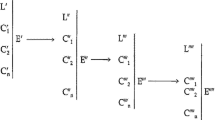Abstract
By setting out the grammar of event causality, as developed by Hume and Mackie, in contrast to the grammar of agent causality in the natural sciences, a kind of hybrid hierarchical format for chemical explanations is sketched. From this starting point the history of agentive concepts in chemistry is displayed as a progression from Newton’s ‘forces’, through the nineteenth century concepts of ‘affinity’ and ‘valency’ to recent theories of molecular binding in terms of the migration of electrons and protons as powerful particulars. The final stage of this development is the rewriting of chemical theory in terms of energy.

Similar content being viewed by others
Notes
Admirable though Cheng approach is, there are some serious shortcomings, in particular in her understanding of the Kantian proposal of schematisms (Wittgenstein ‘hinges’). Close study of her paper shows that it deals with the conditions under which the attribution of a causal power is reasonable, but has nothing to say on what causal powers are!
Surely the thought that an event is a cause if it increases the probability of an expected effect is a consequence of believing that the event is a cause, and not an analysis of the causal concept itself (unless, of course, one were under the spell of neo-positivism!).
I am grateful to Gareth McGuire for instruction in these matters.
The expression ‘noble octet for the stable electron configuration derives from the determining role this structure has on the properties of the ‘noble’ gases, argon, neon etc.
References
Atkins, P.W., Beran, J.A.: General chemistry. New York, Scientific American Books (1989)
Belnap, N.: A theory of causation: causae causantes (originating causes) as Inus conditions in branching space-times. Br. J. Philos. Sci. 56 221–253 (2005)
Brown, G.I.: A New Guide to Modern Valency Theory. Longman, London (1973)
Cartwright, N.: Natural Capacities and their Measurement. Oxford University Press, Oxford (1987)
Cheng, P.: From covariation to causation: a causal power theory. Psychol. Rev. 104, 367–405 (1997)
Davy, H.: On some chemical agencies of electricity. Phil. Trans. Roy. Soc. 97, 1–56 (1807)
Dennett, D.: Freedom Evolves. Allen Lane, London (2003)
Ehring, D.: Causation and Persistence. Oxford University Press, New York and Oxford (1997)
Friend, J.N.: The Theory of Valency. Longmans Green, London (1915)
Fownes, G.: A manual of elementary chemistry: theoritical and practical. John Churchill, London (1856)
Gilbert, W.: De Magnete. London (1600)
Graham, T.: Elements of chemistry. London, Baillière (1850)
Harré, R., Madden, E.H.: Causal Powers. Blackwell, Oxford (1975)
Hitchcock, C.: The intransivity of casusation revealed in equations and graphs. J. Philos. 98, 273–299 (2001)
Hiddleston, E.: Causal powers Br. J. Philos. Sci. 56, 27–59 (2005)
Hume, D.: A Treatise of Human Nature. John Noon, Book One, London (1739)
Leibniz, G.W.: The Monodology. Everyman-Dent, London (1714)
Mackie, J.R.: The Cement of the Universe. Clarendon Press, Oxford (1974)
Michotte, A.: The Perception of Causality. Methuen, London (1963)
Newton, I.: Opticks, 4th edn. Royal Society, London (1730)
O’Connor, T.: Persons and Causes. Oxford University Press, Oxford (2002)
Purvis, M.K., Cranefield, S.J.S.: Causal agent modelling. Victoria University, Wellington, New Zealand (Unpublished paper) (1995)
Stemwedel, J.: Causes in chemical explanations. Annals New Yorl Academy Sci. 988, 217–226 (2003)




